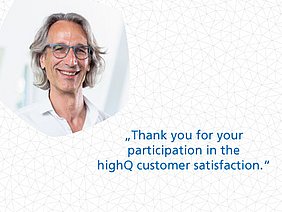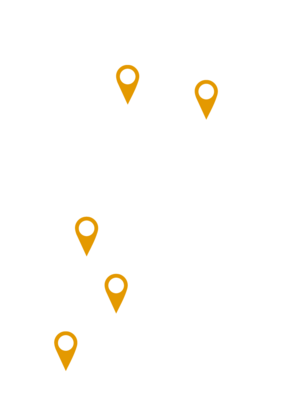Every year we want to know from our customers how satisfied they are with us and our products. The suggestions and criticisms collected help us to further improve our products and eliminate potential problems. The evaluation of the last survey from the fall of 2020 has been completed: "In the overall evaluation, we are doing pleasingly well overall, although somewhat lower than in the previous year," reports Josue Schade, Head of Customer Satisfaction at highQ. "But in the product surveys, our most important products received a lot of approval - the absolute customer favorite is abakusBT. And the importance of the highQ MobilitySuite platform is also becoming increasingly apparent."
In 2020, customer feedback was even more extensive than in previous years, as for the first time users were able to rate not only their "main product" but several highQ products. Customers were also asked for their opinions on project management, operations and hosting. "All in all, a very detailed mood picture emerged," says Josue Schade.
However, the annual customer satisfaction survey is only one of several channels through which highQ receives feedback from its customers. "We have built up a comprehensive set of tools for this purpose," explains Josue Schade. These include on-site workshops together with users to "look over their shoulders." (Last year, however, these could only take place online due to the pandemic). There is also a separate format for project customers, the so-called "lessons-learned" workshops. "Here, too, critical words are expressly welcome," emphasizes Schade, who is also available to highQ customers at any time for direct addresses.
In all of these formats, the new central role proves its worth: "The fact that I am not directly involved in project execution in these formats allows me to provide a more neutral setting and a very open exchange," says Schade, explaining his area of responsibility. The results of customer discussions and workshops are then fed into the development, support, project management and sales departments in a targeted manner. Ultimately, he says, it's about hearing the "reality from the customer's point of view". He uses an example to illustrate what valuable information is obtained in this way: "A developer usually only has a function in the product in hand during the development and test phase. The customer, however, has to repeat some process steps in the software many times a day, and thus has a completely different "user experience". This makes it all the more important to stay close to the customer in order to better understand their way of seeing and working," concludes Schade.
The insights gained flow directly back into product development - among other things, via internal product workshops that involve not only the product development managers but also the support and sales departments and quality management. "In the next step, the customers benefit again from the product optimizations derived from this," says Josue Schade and launches an appeal: "Your ideas and suggestions are needed - let's get better and better together!"








